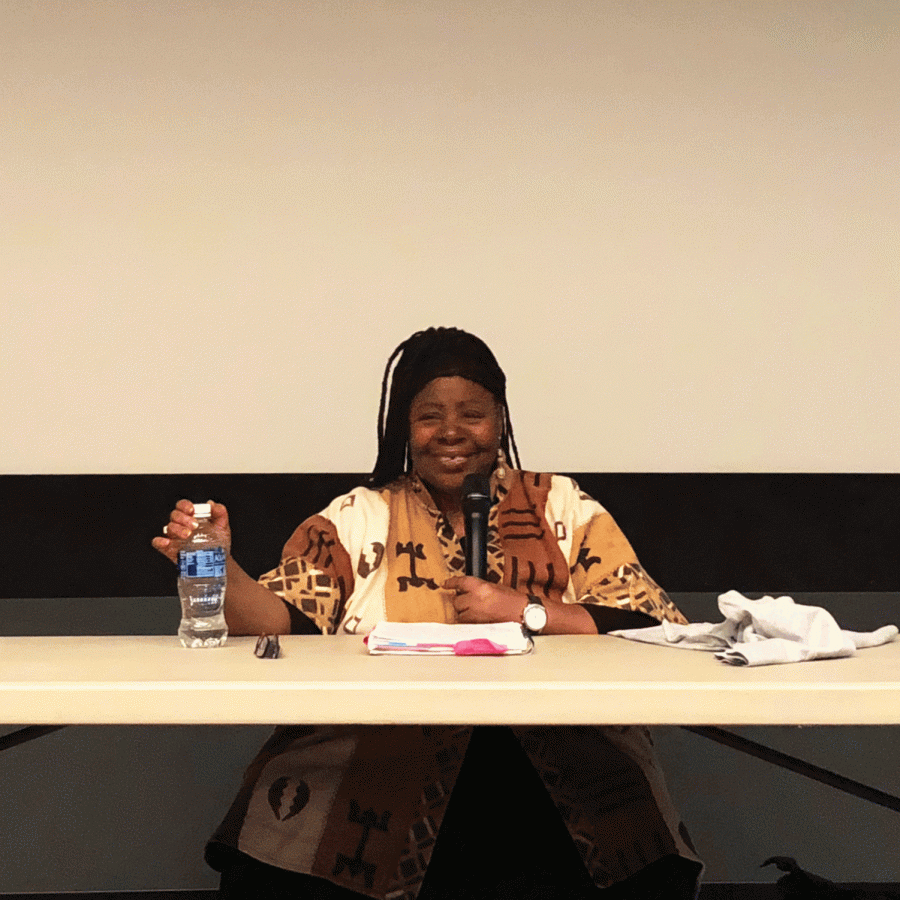Loretta Ross Lectures on Reproductive Rights as Human Rights in MLK Week Keynote Address
Loretta Ross addressed Colgate students on the topic of reproductive rights as human rights, stressing that it’s about uniting under the idea of justice for all. She encouraged movements to work together.
It didn’t matter if one had to stand or sit cross-legged on the floor– on January 25, Colgate students and professors alike crowded Golden Auditorium to listen to Loretta Ross, the 2018 keynote speakers for Martin Luther King, Jr. Week.
In 1994, Ross and a group of African women coined the term “Reproductive Justice,” which, through Ross’ efforts, became a Human Rights movement including women and other marginalized demographics.
“We are the divided and the conquered as long as we don’t share the framework and ideology that I call Human Rights,” Ross said. “We need everybody to understand that there’s a problem with this protofascist movement that we’re in– not just the ones who happen to agree with you like you’re building the cult– but all of us, who are given oppression in our own particular way.”
Ross believes that in order for women to receive reproductive rights, they must fight within the Human Rights framework. She outlined the eight categories of human rights that are relevant to all people’s lives and essential to each sector’s success: political, economic, social, cultural, environmental, developmental and sexual human rights, in addition to civil rights.
There are separate agendas, however, that are not useful to the Human Rights movement.
“We’re carefully taught to serve white supremacy, to protect our own marginalized position,” Ross said.
Ultimately, Ross feels it is not a matter of who is less privileged or who is more disadvantaged. In addressing the LGBTQ movement Ross said, “The right to marry doesn’t solve anything if you’re still poor.”
Senior Emmie McCaffrey commented on Ross’ notion that all human rights are connected.
“We tend to get divided by different topics, and if you think about our education system, women’s studies is one department and sociology is another department. We’re trained to categorize and compartmentalize different rights issues or issues in general,” she said.
McCaffrey’s comment speaks to Ross’ thoughts on education.
“We don’t need degrees in the movement,” Ross said. Rather, Ross calls on all people, especially white people, with a radical consciousness. She asked, “How the hell are we gonna defeat white supremacy without the white people who created it?”
Ross explained that Trump’s presidency has polarized the white population, and those who do not support him have drawn attention to his white supremacist platform. Trump, to his detriment and to the Human Rights movement’s benefit, has brought issues that were once hidden in the margins of society to the headlines of mainstream media.
“I see [Trump] as the gift that keeps on giving…without intending to do it, he splintered the white solidarity base,” she said.
Ross addressed those who support Trump and his anti-abortion stance, arguing that forcing a woman to be pregnant against her will is a form of enslavement.
“I’m sorry, boys, every ejaculation doesn’t deserve a birth certificate,” Ross said.
Ross believes human rights, such as the right to have or not have a child, are part of “a provisional passport into white supremacy” that can be retracted at any moment. And that is why those who fight for healthcare must also fight for nontoxic neighborhoods, and those who fight for world hunger must also fight for freedom of religion.
“Our rights under the constitution are tentative at best,” Ross said. “[The Supreme Court] can decide at any point that abortion is now again criminalized, and that the fetus is a human being from the moment an eager sperm penetrates an egg.”
Sophomore Hallie Burke noticed a similar divide on Colgate’s campus.
“In the past, a bunch of movements have worked individually instead of working together. When [Loretta Ross] talked about the women’s movement versus an anti-racist movement versus a workplace equality movement, instead of having them intertwined, they’ve been really separate. That really stuck with me because at Colgate I’ve realized there are a lot of issues with feminism and what type of woman we’re fighting for,” Burke said.
The reproductive justice movement, Ross explained, is about uniting under the common concern for justice for all, despite individual opinions and individual goals.
“There are women who are dying now in detention centers because no one will give them access to birth control or birthing services. They won’t even give women in detention centers sanitary supplies,” stated Ross.
Reproductive justice is not about pro-choice versus pro-life, which is an oversimplified dichotomy that fails to accurately explain the complicated way people contemplate abortion and Human Rights in general. Ross believes reproductive justice extends beyond abortion laws.
Ross posed the question, “What’s the point of having kids if they can’t get through kindergarten without being shot by a cop?”
Loretta Ross conveyed the message that reproductive rights are intrinsically connected to Human Rights to her audience, cross-legged and captivated.
Contact Lucy Feidelson at [email protected].




